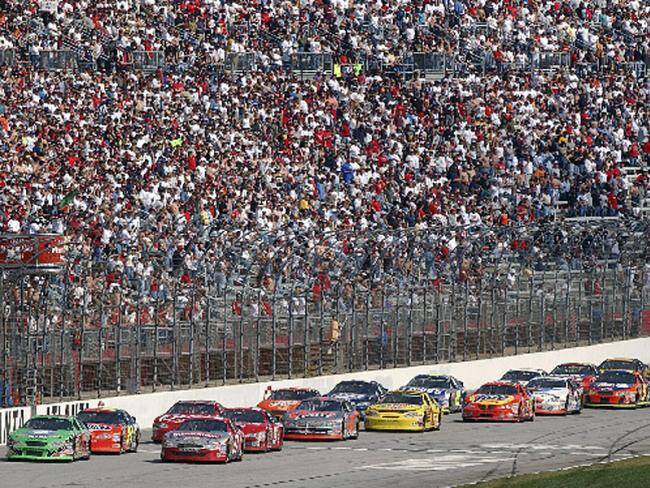For most of its history, Georgia was a gimme for the Democrats in presidential elections, but the population boom of the past half-century has made the GOP supreme.
(Un)Conventional Wisdom is presenting a short history of each state’s role in modern presidential politics. Georgia is the fourth in the series.
Georgia is one of several Southern states where rapid population growth has so far benefited Republicans. The number of votes cast for president here first topped one million in 1964, when Barry Goldwater was the first GOP nominee to ever carry the state. Southern Democrats Jimmy Carter (falsely raising the hope of a lasting biracial Democratic majority) and Bill Clinton each briefly interrupted the Republican trend, but when Georgia hit three million votes, in 2004, it gave a 17-point victory to George W. Bush. Turnout was just short of four million votes in both 2008 and 2012, with the GOP margin back down to single digits. In 2008, Republican John McCain won 76 percent of white voters, while Democrat Barack Obama got 98 percent of black voters. (There were no exit polls here in 2012.)
Population growth in Georgia doesn’t look quite the same as in Florida, Nevada, and Texas, all states that are more urban than the nation as a whole. Georgia has become synonymous with suburban sprawl, with the New Georgia Encyclopedia reporting, “metropolitan Atlanta is the least densely populated metropolitan area in the United States, with only 1,370 persons per square mile, compared with 5,400 persons per square mile in Los Angeles…. Since 1987 the Atlanta region has lost an average of fifty acres of tree cover per day. Much of this loss is a direct result of encroachment by low-density sprawl development into forested and agricultural areas.”
Atlanta magazine’s Rebecca Burns reported last year, “the 28-county region that the U.S. Census bureau considers to be metro Atlanta has a bigger land area than the entire state of Massachusetts.” Burns cites research that has “Atlanta spreading all the way to Chattanooga and eventually engulfing Charlotte.” She warns, “as sprawling metropolises converge with each other, it will turn our terrible traffic into something apocalyptic. It’s also likely to create an environmental mess.”
How to manage this growth will long be one of the top issues in both federal and local elections here. So far, more Georgia voters seem to trust the Republican Party and its personal-freedom approach to housing (if people want large lots, make them available) and transportation (people want to drive to work, not wait for trains). But even some Republicans in Georgia want the government to do more about transportation. GOP Gov. Nathan Deal recently signed a law that hikes the gas tax and adds a hotel tax to help pay for the upkeep of roads and bridges; the law also gives counties the ability to levy a one-cent sales tax for public transit (if the county’s voters approve it).

Georgia is unusual among Southern states in that it relies more on revenue from income taxes than from sales taxes (which disproportionately affect low-income households), but it may be evolving toward the fiscal policies of its neighbors. Last year, voters overwhelmingly passed a constitutional amendment capping its income tax rate at 6 percent, raising the likelihood that legislators will look to the sales tax to solve any future budget crisis.
Atlanta—which claimed, with only partial success, to be “the city too busy to hate” during the struggle for civil rights for black Americans—provides a base for progressive politics in Georgia, even if it’s rarely on the winning side in statewide elections. In 2012, Obama won a margin of 360,000 votes in Atlanta’s Fulton County and neighboring Clayton and DeKalb counties. But when you add the rest of the dozens of counties in metro Atlanta, the Democrat’s margin shrinks to just 13,000. That’s not yet enough to offset the surplus of more than 300,000 votes that the GOP gets in the rest of the state.
Georgia leans strongly to the right in Republican presidential primaries, giving wins to Mike Huckabee in 2008 and Newt Gingrich in 2012. In the latter year, establishment candidate Mitt Romney won only three counties: Atlanta’s Fulton County and next-door DeKalb County, and Savannah’s Chatham County. Another case of the big city getting swamped by exurban and rural votes. In 2008, this was Democrat Obama’s best primary, giving him 66.4 percent.
Another note about Georgia: If you're a candidate in Georgia, your campaign ads are going out to a lot of adults who couldn't vote for you if they wanted to: 3.4 percent of all voting-age residents in Georgia are ineligible to vote due to felony convictions, the highest rate in the U.S.
Georgia demographics (Census Bureau)
Where Georgia residents come from (New York Times)
Religious composition of Georgia (Pew Research Center)
Georgia Secretary of State (Elections division)
Note: The best source for state- and county-level presidential election results is Dave Leip’s Atlas of Presidential Elections.

Georgia has been more Republican than the U.S. as a whole since 1984.
More: Delaware, Pennsylvania, New Jersey, Connecticut








